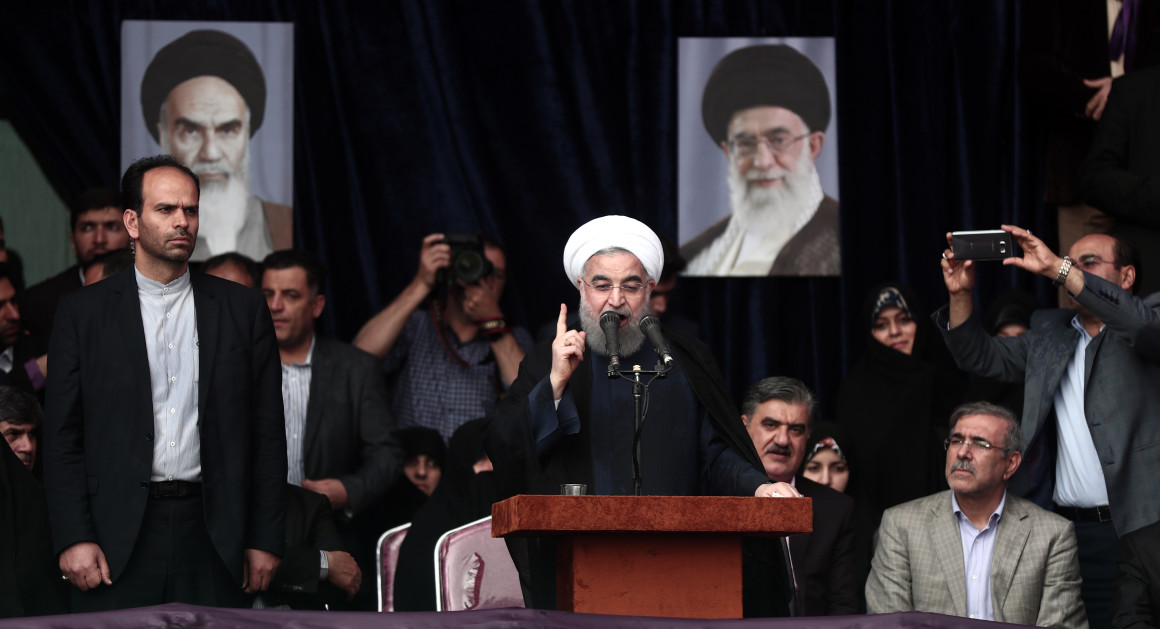Iran held its twelfth presidential election on Friday, securing another four-year term for the popular incumbent President Hassan Rouhani, who has vowed to push for the removal of any remaining US sanctions on Iran, crack down on extremism inside the country, and secure political and social freedoms for Iran’s citizens.
“Today, Iran is standing taller than at any time before and is ready to expand its relations with the world based on mutual respect and national interests,” Rouhani said in his victory speech on Saturday.
According to Iran’s election committee, 73 percent of 56 million eligible voters turned out to vote on May 19, setting a new record. Rouhani received over 57 percent of the 41 million votes cast, which will keep him in office until August 2021. Conservative hardliner and fellow cleric Ebrahim Raisi, a veteran court judge, was seen as Rouhani’s main challenger in what ended up being a four-man race. Raisi received 15.8 million votes, or nearly 40 percent.
Rouhani was first elected to the presidency in 2013, when he staked his political fortunes on reintegrating Iran into the global economy and beating down international isolation. His first term in office partly achieved that goal, when in July 2015 the Iranian government reached an historic deal, known as the Joint Comprehensive Plan of Action (JCPOA), with the P5 +1, the five permanent UN Security Council members plus Germany.
In exchange for Tehran agreeing to limit its nuclear program, more than $29 billion of Iran’s frozen offshore capital was released, sanctions against oil exports were lifted, foreign firms were allowed to invest in Iran’s oil and gas, automotive, and hotel industries, and Iran was reintegrated into the global banking system. Iran’s oil sales experienced an upswing, from one million barrels per day (bpd) in 2015 to 2.5 million bpd since the nuclear deal came online in January 2016.
But the rest of Iran’s economy has not felt the benefits, which Rouhani promises in his second term. Prices increase annually on average by seven percent, and close to 30 percent of Iran’s youth are unemployed.
“If the [Iranian] nation wants the sanctions to be lifted, and if everyone comes to the field, and if the [Supreme] Leader [Ayatollah Ali Khamenei] takes the responsibility of leading this [issue], we will all stand behind the supreme leader. [Achieving] the [lifting of non-nuclear sanctions] is difficult but it is possible,” Rouhani said at a press conference in Tehran on Monday.
Despite the removal of multilateral sanctions thanks to the JCPOA, a number of US sanctions remain in place. American embargos on trade still remain in place that include penalties on companies and banks doing business with Iran – sanctions that tend to demotivate European investments in the Iranian market.
Rouhani’s efforts, however, could be side-stepped by Iran’s Supreme Leader Ayatollah Ali Khamenei who, according to Iran’s theocratic system of government, has the final say on all foreign policy matters. Khamenei has vowed, time and again, to reject normalization of ties with the US, and was skeptical of the JCPOA.
"The nuclear agreement (JCPOA) should not become a tool for the enemy to pressure the people of Iran and our country from time to time," Khamenei said in a speech he delivered in November of last year.
US President Donald Trump and his administration have been equally suspicious of Iran. Trump has described the JCPOA as "one of the worst deals ever signed,” although last month his administration certified to Congress that Iran is in compliance with the JCPOA and therefore will continue to receive sanctions relief. The agreement, however, is currently under review.
Rouhani’s victory coincided with Trump’s first overseas visit as US president. On Saturday, Trump arrived in Saudi Arabia, a close US ally, where he blamed Iran “for so much instability.”
"For decades Iran has fueled the fires of sectarian conflict and terror; it’s a government that speaks openly of mass murder, vowing the destruction of Israel, death to America, and ruin for many leaders and nations in this very room,” Trump said on Saturday from Riyadh, where he addressed 50 leaders from Muslim-majority countries. While in Riyadh Trump and Saudi King Salman signed a $350 billion weapons deal.
Iran’s Foreign Minister Javad Zarif, who was responsible for brokering the JCPOA on Iran’s behalf, responded to Trump’s remarks via Twitter: “Iran- fresh from real elections- attacked by US President Donald Trump in that bastion of democracy and moderation. [Is that] foreign policy or milking KSA of $480 billion?”







 Russian peacekeeping forces, deployed in the Karabakh (Garabagh) region of Azerbaijan since 2020, have commenced their withdrawal from the area.
Russian peacekeeping forces, deployed in the Karabakh (Garabagh) region of Azerbaijan since 2020, have commenced their withdrawal from the area.
 The number of evacuees from flooded areas in Kazakhstan has reached 97,852 people, including about 32,856 children since March 27.
The number of evacuees from flooded areas in Kazakhstan has reached 97,852 people, including about 32,856 children since March 27.
 Azerbaijan officially unveiled the logo for the upcoming 29th session of the Conference of the Parties to the United Nations Framework Convention o...
Azerbaijan officially unveiled the logo for the upcoming 29th session of the Conference of the Parties to the United Nations Framework Convention o...
 The Kazakh authorities have increased their arbitration claims against international oil companies involved in the development of the Kashagan oil ...
The Kazakh authorities have increased their arbitration claims against international oil companies involved in the development of the Kashagan oil ...



